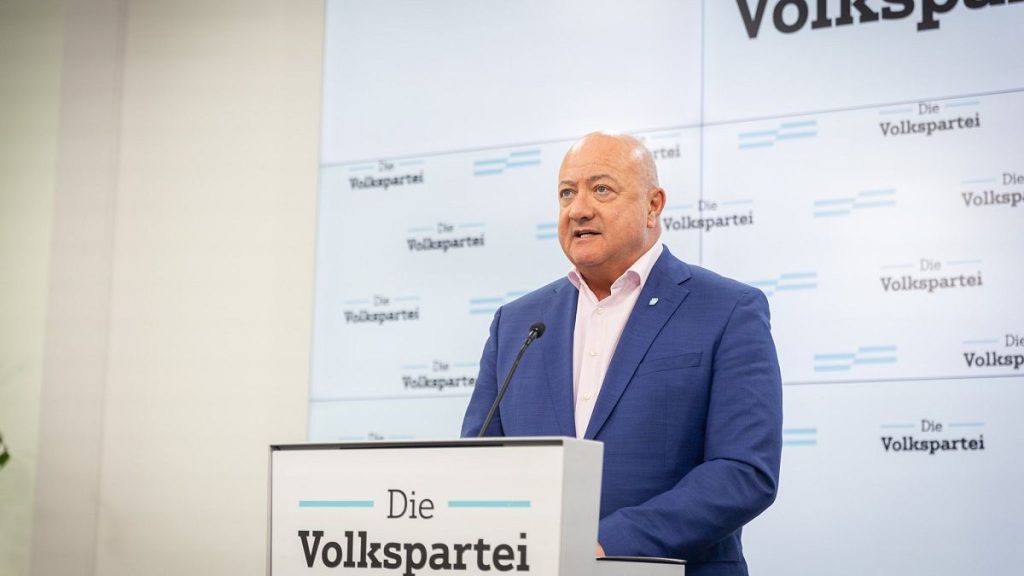The Austrian political landscape is undergoing a significant shift as Chancellor Karl Nehammer prepares to step down following the collapse of coalition talks. This marks the second unsuccessful attempt to form a new government after the September elections, underscoring the complexities and challenges inherent in Austria’s multi-party system. Nehammer’s resignation sets the stage for the Austrian People’s Party (ÖVP) to navigate a period of transition and uncertainty, with Christian Stocker, the party’s General Secretary, nominated as the interim leader. Stocker, a seasoned lawyer and parliamentarian, brings to the table a reputation for adept crisis management and communication, qualities that will be crucial in steering the ÖVP through the current political turbulence.
The backdrop to this leadership change is a fragmented political landscape shaped by the outcome of the September elections. The right-wing Freedom Party (FPÖ) emerged as the largest party, securing 28.8% of the vote, but fell short of a majority. This necessitated the formation of a coalition government, a process that has proven fraught with difficulties. Initial attempts to forge a three-party coalition involving the ÖVP, the Social Democrats (SPÖ), and the liberal Neos party ultimately faltered, with Neos unexpectedly withdrawing from the discussions. This setback triggered the second round of coalition talks between the ÖVP and SPÖ, which also failed to yield a viable governing agreement, ultimately leading to Nehammer’s decision to resign.
The collapse of these coalition talks highlights the deep divisions within Austrian politics and the challenges of finding common ground between parties with divergent ideologies. The rise of the FPÖ has further complicated the political landscape, introducing a strong right-wing voice that has reshaped the dynamics of coalition negotiations. The failure to form a stable government reflects the difficulties of accommodating the FPÖ’s influence while also adhering to the principles and priorities of other parties. This political impasse has created a sense of uncertainty and instability, prompting the need for strong leadership to navigate the challenges ahead.
Christian Stocker’s nomination as interim leader represents the ÖVP’s attempt to provide stability and direction during this transitional period. His experience as General Secretary, coupled with his reputation for effective communication, positions him to manage the immediate challenges facing the party. Stocker’s task will be to guide the ÖVP through the aftermath of Nehammer’s resignation and to explore potential paths forward for forming a stable government. This will involve navigating the complex political landscape, engaging with other parties, and seeking to build consensus around a shared agenda. Stocker’s success in this role will be critical to the ÖVP’s ability to maintain its influence and contribute to the formation of a functional government.
The upcoming period will be crucial for Austrian politics as the nation grapples with the challenges of forming a stable government amidst a fragmented political landscape. The outcome of these efforts will have significant implications for the country’s future direction, particularly concerning key policy areas such as economic policy, social welfare, and immigration. The ability of the different political parties to find common ground and forge a working coalition will be essential for addressing the pressing issues facing Austria and ensuring political stability. The success of these negotiations will hinge on the willingness of parties to compromise and prioritize the national interest over partisan agendas.
The selection of Christian Stocker as interim leader of the ÖVP marks a pivotal moment in Austrian politics. His leadership will be tested as he navigates the complex political terrain and seeks to forge a path forward for his party and the nation. The outcome of these efforts will have far-reaching consequences for Austria’s political stability and future direction. Stocker’s ability to effectively communicate, build consensus, and steer the ÖVP through this challenging period will be crucial in shaping the next chapter of Austrian politics. The nation watches closely as the political drama unfolds, anticipating the formation of a stable government capable of addressing the country’s pressing needs.














